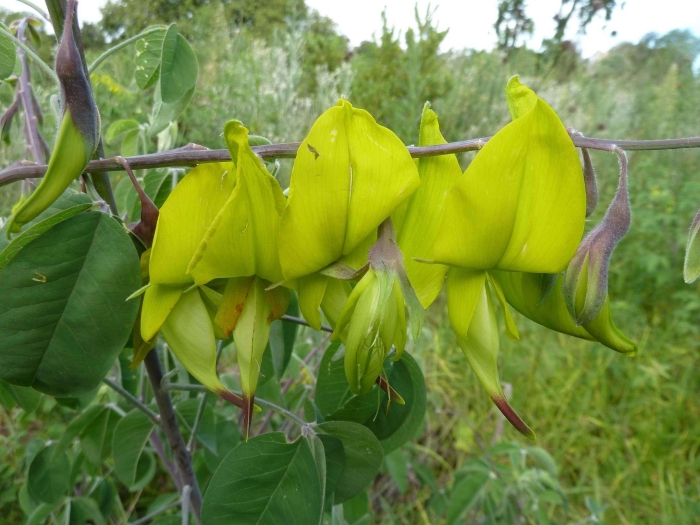Canary Bird Bush
(Crotalaria agatiflora)
Canary Bird Bush (Crotalaria agatiflora)
/
/

© Andrew Hankey
CC BY-SA 4.0
Image By:
© Andrew Hankey
Recorded By:
Copyright:
CC BY-SA 4.0
Copyright Notice:
Photo by: © Andrew Hankey | License Type: CC BY-SA 4.0 | License URL: http://creativecommons.org/licenses/by-sa/4.0/ | Uploader: andrew_hankey | Publisher: iNaturalist |






















Estimated Native Range
Summary
Crotalaria agatiflora, commonly known as Canary Bird Bush or winged rattlepod, is a perennial shrub native to the open woodlands and grasslands of East Africa, including Kenya and Tanzania. It is a fast-growing plant that can reach heights of 6-10 feet (1.8-3 meters) with a similar spread. This species is characterized by its bright yellow, pea-like flowers that bloom in long terminal racemes, which are quite showy and attract pollinators. The flowering season typically occurs during the warm months, and the plant is also noted for its winged seed pods that rattle when dry.
Canary Bird Bush is valued for its ornamental flowers and is often used in tropical and subtropical gardens as a specimen plant or in mixed borders. It thrives in full sun to partial shade and prefers well-drained soils. While it is drought-tolerant once established, it benefits from regular watering during prolonged dry periods. In cultivation, it may require pruning to maintain a desirable shape and to prevent it from becoming leggy. Gardeners should be aware that all parts of the plant are toxic if ingested and it can be invasive outside its native range, so care should be taken to control its spread.CC BY-SA 4.0
Canary Bird Bush is valued for its ornamental flowers and is often used in tropical and subtropical gardens as a specimen plant or in mixed borders. It thrives in full sun to partial shade and prefers well-drained soils. While it is drought-tolerant once established, it benefits from regular watering during prolonged dry periods. In cultivation, it may require pruning to maintain a desirable shape and to prevent it from becoming leggy. Gardeners should be aware that all parts of the plant are toxic if ingested and it can be invasive outside its native range, so care should be taken to control its spread.CC BY-SA 4.0
Plant Description
- Plant Type: Shrub
- Height: 8-10 feet
- Width: 8-10 feet
- Growth Rate: Rapid
- Flower Color: Green, Yellow
- Flowering Season: Spring, Summer, Fall
- Leaf Retention: Evergreen
Growth Requirements
- Sun: Full Sun, Part Shade
- Water: Low, Medium
- Drainage: Medium
Common Uses
Border Plant, Butterfly Garden, Potted Plant, Showy Flowers
Natural Habitat
Native to the open woodlands and grasslands of East Africa
Other Names
Common Names: Canary Bird Bush, Yellow Bird Bush
Scientific Names: , Crotalaria agatiflora, Crotalaria agatifolia, Crotalaria engleri, Crotalaria engleri, Crotalaria grandibracteata,
GBIF Accepted Name: